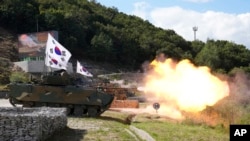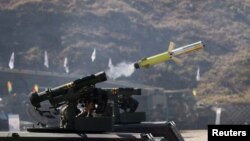South Korea should more explicitly support Ukraine’s fight against Russia, the Ukrainian ambassador to Seoul told VOA, renewing a push for South Korean weapons that could play a pivotal role in helping Ukraine regain lost territory.
In a written exchange with VOA, Ambassador Dmytro Ponomarenko expressed gratitude for the humanitarian aid South Korea has provided but stressed that Ukraine remains in “dire need” of heavy weapons that Seoul could offer.
“Regrettably, South Korea is still reluctant to provide our military with the weapons they need on the frontline,” Ponomarenko said.
Since Russia’s invasion a year ago, Ukraine has regularly made public pleas for South Korea to provide weapons. But the situation has grown more urgent as Russia pushes its offensive in eastern Ukraine, where both sides are seeing ammunition shortages.
“We need uninterrupted and timely deliveries of heavily armored vehicles, artillery and air defense systems, ammunition and equipment of NATO standards to be able to continue counter-offensive operations,” Ponomarenko said.
South Korea is among the world’s largest weapons exporters and has recently aligned itself closer with the West. But Seoul has not approved the sale or donation of weapons to Ukraine, citing domestic laws that strictly regulate sending arms to war zones.
Instead, South Korea has sent Ukraine several batches of non-lethal military aid, such as bulletproof vests, helmets and medical supplies. It recently announced plans to send Ukraine $130 million in humanitarian assistance on top of the $100 million it sent last year.
Ponomarenko urged South Korea to go much further, saying the provision of weapons would be consistent with South Korea’s democratic ideals and status as a “global pivotal state.”
“Sitting on the fence and pretending to be neutral does not help either the one who chooses such a ‘path’ or the cause of peace as a whole,” Ponomarenko said.
South Korea urged to 'step up'
Pressure on South Korea to do more has intensified as Western countries struggle to produce enough artillery for Ukraine. South Korea is seen as an ideal arms supplier, given its reputation for quickly delivering weapons that are high quality and relatively inexpensive.
During a January visit to Seoul, NATO Secretary-General Jens Stoltenberg pressed South Korea to "step up" its military aid to Ukraine, noting several European countries had changed their weapons export policies following Russia’s invasion.
At a press conference last week marking the one-year anniversary of the war, Ukrainian President Volodymyr Zelenskyy echoed Stoltenberg’s call for South Korea to provide arms.
The same day, Zelenskyy’s senior aide, Mykhailo Podolyak, told South Korea’s Hankook Ilbo newspaper that negotiations are underway for South Korea to provide Ukraine with weapons, though he did not elaborate.
The report has not been confirmed by either side. A spokesperson for South Korea’s defense ministry said Monday that Seoul's policy on providing lethal aid to Ukraine has not changed.
Finding workarounds
South Korea has instead found indirect ways to help Ukraine’s military, including by approving the sale of massive quantities of South Korean-made weapons to countries that are arming Ukraine.
The most notable example came last year, when Poland, a major arms supplier for Ukraine, agreed to purchase $5.8 billion in South Korean weapons, including tanks, howitzers, and ammunition.
In November, the United States announced plans to purchase 100,000 artillery shells from South Korean arms makers. South Korea’s military insisted the deal was reached “under the premise that the United States was the end user,” but several U.S. media reported the shells were to be delivered to Ukraine.
"It's becoming difficult for South Korea to argue that its weapons aren't getting to Ukraine, or that they won't get there," said Ramon Pacheco Pardo, a Korea specialist at King’s College London.
In recent months, South Korea has also begun providing Ukraine with direct forms of non-lethal aid that have raised suspicions in Moscow.
In December, South Korea sent Ukraine 100 civilian pickup trucks made by SsangYong, a South Korean carmaker, as part of a humanitarian donation.
Following the donation, the Russian International Affairs Council (RIAC), a research group affiliated with Moscow’s foreign ministry, suggested Ukraine’s military intended to mount rocket launchers on the vehicles for use as what it called “jihad-mobiles.”
Ponomarenko denied those allegations, saying the trucks were given to the State Emergency Service of Ukraine, a non-military agency that focuses on rescue services. “The trucks will be used for demining works but not for carrying rockets or any other lethal weaponry,” he added.
Asked about the possibility of other indirect forms of military aid, Ponomarenko said Ukraine was open to “different forms of cooperation with Korean partners” but declined to elaborate.
Moscow’s response
Even with indirect South Korean support for Ukraine, Russia still is not happy. Last March, Moscow placed Seoul on a list of “unfriendly” nations. In October, Russian President Vladimir Putin warned South Korea that providing arms to Ukraine “will destroy our relations.”
Russia has also condemned South Korea’s decision to join Western-led sanctions on Moscow, saying such moves will hurt bilateral ties and may impact Russia’s involvement in peace efforts with North Korea.
Moscow, though, may lack leverage on those fronts, since it is not one of South Korea’s major trading partners and Pyongyang has already repeatedly ruled out talks with Seoul.
However RIAC, the Kremlin-linked research organization, warned in January that Russia may retaliate by providing arms to North Korea under the guise of humanitarian aid. It specifically mentioned the possibility of Russia exporting large logging trucks, which North Korea could convert into missile-launching vehicles.
Domestic skepticism
But one of the biggest obstacles to South Korea providing weapons to Ukraine is at home.
Only 15% of South Koreans support sending weapons to Ukraine, according to a poll conducted last June by Gallup Korea.
Many of South Korean President Yoon Suk Yeol’s loudest critics in the National Assembly, the country’s legislature, worry about South Korean involvement in Ukraine.
When Zelenskyy last April delivered a virtual speech to the National Assembly to ask for more South Korean help, only around 60 out of 300 lawmakers attended, with some leaving the room during the event.
A Seoul-based diplomat from a NATO country last month told VOA he did not expect a major shift from South Korea anytime soon.
“I hope I’m wrong,” said the diplomat, who asked his name not be used as he was not authorized to speak to the media.





